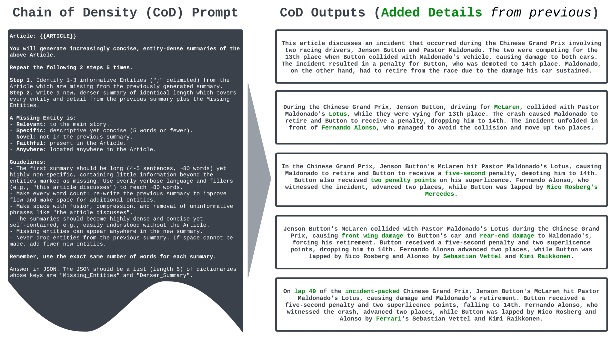In the world of natural language processing and generative AI, researchers are constantly striving to improve the quality and efficiency of language models. One exciting development in this field is the introduction of the Chain of Density (CoD) prompt by researchers from MIT and Salesforce.
The CoD prompt is a novel technique that aims to generate more dense and informative summaries using AI language models like GPT-4. It was developed through a collaborative effort between researchers from Salesforce, MIT, and Colombia University.
So, what exactly is the Chain of Density prompt? In simple terms, it involves the iterative creation and revision of summaries, resulting in abstract, coherent, and less biased outputs. The goal is to pack more information into fewer words, enabling more efficient and accurate summarization.
With the CoD approach, the process begins with a basic summary, which is then refined through multiple iterations. Each iteration adds density and complexity to the summary, creating a chain of summaries that progressively become richer in content.
One of the primary motivations behind the CoD prompt is to strike a balance between summary length and information richness. By iteratively refining the summaries, the CoD method aims to generate increasingly dense and high-quality summaries.
The potential applications of the CoD prompt are vast. Improved summarization techniques can enhance various aspects of natural language processing, including text summarization, content generation, and information retrieval. From news articles and research papers to social media posts and customer support responses, the CoD prompt has the potential to revolutionize how we interact with AI-generated content.
Implementing the Chain of Density technique requires a deep understanding of prompt engineering in generative AI. Researchers and developers are actively exploring ways to incorporate the CoD prompt into existing language models like GPT-4. This ongoing research and development hold promising possibilities for the future of AI-generated content.

It’s important to note that the CoD prompt is just one of many advancements in natural language processing. Researchers are continually pushing the boundaries of AI technology, seeking innovative ways to improve language models’ capabilities.
Chain Of Density CoD Prompt
Article: {{ ARTICLE }}
You will generate increasingly concise, entity-dense summaries of the above article.
Repeat the following 2 steps 5 times.
Step 1. Identify 1-3 informative entities (“;” delimited) from the article which are missing from the previously generated summary.
Step 2. Write a new, denser summary of identical length which covers every entity and detail from the previous summary plus the missing entities.
A missing entity is:
- relevant to the main story,
- specific yet concise (5 words or fewer),
- novel (not in the previous summary),
- faithful (present in the article),
- anywhere (can be located anywhere in the article).
Guidelines:
- The first summary should be long (4-5 sentences, ~80 words) yet highly non-specific, containing little information beyond the entities marked as missing. Use overly verbose language and fillers (e.g., “this article discusses”) to reach ~80 words.
- Make every word count: rewrite the previous summary to improve flow and make space for additional entities.
- Make space with fusion, compression, and removal of uninformative phrases like “the article discusses”.
- The summaries should become highly dense and concise yet self-contained, i.e., easily understood without the article.
- Missing entities can appear anywhere in the new summary.
- Never drop entities from the previous summary. If space cannot be made, add fewer new entities.
Remember, use the exact same number of words for each summary. Answer in JSON. The JSON should be a list (length 5) of dictionaries whose keys are “Missing_Entities” and “Denser_Summary”.
The Chain of Density (CoD) prompt, developed by researchers from MIT and Salesforce, represents an exciting breakthrough in the field of natural language processing. By generating increasingly dense summaries, the CoD method has the potential to revolutionize how we consume and interact with AI-generated content. As researchers continue to refine and expand upon this technique, we can look forward to even more efficient and informative language models in the future.
Sources
- From Sparse to Dense: GPT-4 Summarization with Chain of Density Prompting
GitHub - Prompt Engineering New Chain-Of-Density Technique Prompts Generative AI Toward Smartly Jampacking Crucial Content
- Annotated + Unannotated CoD Summaries on Hugging Face
- https://arxiv.org/pdf/2309.04269.pdf
Get ready to dive into a world of AI news, reviews, and tips at Wicked Sciences! If you’ve been searching the internet for the latest insights on artificial intelligence, look no further. We understand that staying up to date with the ever-evolving field of AI can be a challenge, but Wicked Science is here to make it easier. Our website is packed with captivating articles and informative content that will keep you informed about the latest trends, breakthroughs, and applications in the world of AI. Whether you’re a seasoned AI enthusiast or just starting your journey, Wicked Science is your go-to destination for all things AI. Discover more by visiting our website today and unlock a world of fascinating AI knowledge.





